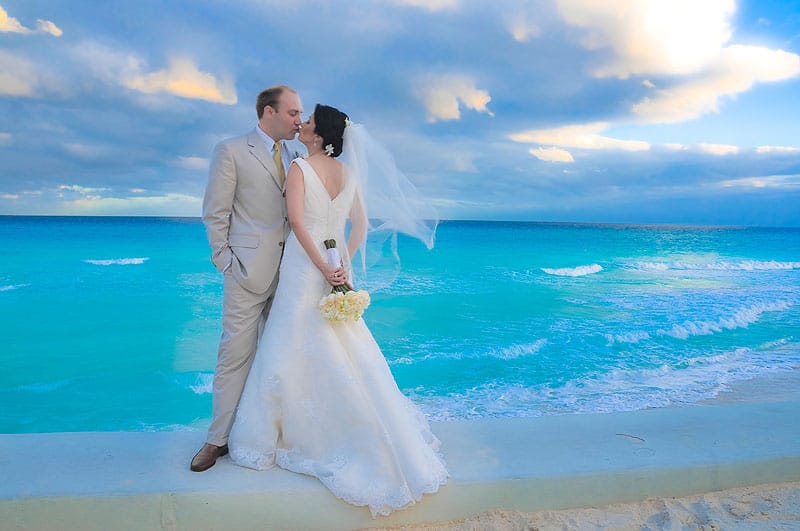 CarlosMendozaPhoto/www.creativecommons.org
CarlosMendozaPhoto/www.creativecommons.org
A destination wedding is the ideal way to combine adventure and romance, giving the happy couple a chance to get married in a dream setting.
Mexico is a popular wedding destination for Canadian couples, as it offers great value for money and provides an endless variety of picture-perfect settings that add tropical glamour to the bride’s big day.
Legality
Canada, along with almost all other countries, automatically recognizes civil weddings performed in Mexico.
However, every Mexican state has slightly different regulations, so couples are urged to check the requirements of the state where they plan to get married before making their travel plans.
An officer of the Registrar General’s Office performs legal civil weddings in Mexico in Spanish. Additional fees are charged to have the official leave the office and perform the ceremony on the beach or in resort.
Couples should receive both short and long copies of their Mexican marriage license, called the ‘Acta de Matrimonio’, and have it certified as legal in Mexico before returning home and having it translated into English by a certified translator in Canada.
Religious ceremonies, typically performed after a civil ceremony, are not legally binding in Mexico.
Canada also recognizes same-sex marriages performed in Mexico City – the only place where same-gender weddings are currently legal in Mexico. Same-sex couples must meet the same requirements for marriage in Mexico as any other couple.
Costs
The cost for a destination wedding in Mexico varies according to the Mexican state where the couple is going to get married.
Generally though, a wedding and honeymoon combination at a moderately-priced resort in Mexico costs less than an equivalent wedding held in Canada and a honeymoon in Mexico.
Witnesses
Up to four witnesses are required for Mexican weddings. Each witness must be at least 18 years old and have an original passport, along with some copies. Couples marrying at resorts may find the resort will provide witnesses.
Blood Tests
Blood tests are required to verify that the engaged couple has no sexually transmitted diseases. The blood tests must be done in Mexico at least three days – but no more than 14 days – before the wedding. Some Mexican states also require chest x-rays. Most major hotels and resorts work with medical centres and doctors who can perform these tests.
Each Mexican state has different laws if the blood tests show that one or both parties have a sexually transmitted disease. The couple may not be allowed to marry, or the uninfected person may be asked to sign a document stating that they were notified of their intended spouse’s sexually transmitted disease.
Waiting Time
Couples have to be in Mexico for three business days before they can submit a marriage license application at a civil registrations office, which is also known as the ‘Registro Civil’. Business days exclude weekends and the following national holidays: New Year’s Day, Constitution Day Memorial (February), Birthday Memorial for Benito Juarez (March), May Day, Independence Day (September), Revolution Day (November) and Christmas Day. CarlosMendozaPhoto/www.creativecommons.orgNational holidays in Mexico may be observed for two days, which are not always concurrent. Couples should check the exact dates of national holidays in the year they plan to marry with the Mexican consulates in Canada.
CarlosMendozaPhoto/www.creativecommons.orgNational holidays in Mexico may be observed for two days, which are not always concurrent. Couples should check the exact dates of national holidays in the year they plan to marry with the Mexican consulates in Canada.
Required Documents
Both parties need their passport, as well as a copy of their passport. They also need the tourist card they received at the airport, their original birth certificate, and a completed marriage license application. Canadian birth certificates must have an apostille-certified translation in Spanish, obtained at the Mexican consular in the region of Canada where the birth certificate was issued.
Once these documents are submitted, couples must wait for the application processing, which takes up to two days.
Special Considerations
Divorced or widowed Canadian residents who want to get married in Mexico will need to bring an apostille-certified copy of their divorce decree or the death certificate of the former spouse. The Mexican consular in the region of Canada where the divorce decree or death certificate was issued will certify the documents.
A few Mexican states require a divorced person to have been divorced anywhere from a month to one year before remarrying – and this law generally applies only to divorced women, not divorced men.
Symbolic Ceremonies
Couples who have their hearts set upon a destination wedding in Mexico may find the requirements a hassle that detracts from the enjoyment of their trip. In this case, a symbolic ceremony – where the couple legally marries in Canada and then has a mock wedding in Mexico – is a popular option.
These couples find that they can relax and enjoy the ceremony more since there are no details to worry about. Symbolic weddings look exactly like real weddings, so couples will have wedding photos and videos of their special wedding in Mexico to show to their family and friends.
Renewing wedding vows in Mexico is also a popular choice for couples who are looking for the romance and magic of a ceremony held on the beach, surrounded by family and friends.
There are no special requirements for a symbolic wedding or the a renewal of vows ceremony, so couples are free to enjoy their time as they wish before and after the ceremony: be it scuba diving in Cozumel, getting a massage at a spa in Acapulco, or shopping in Cancun.


